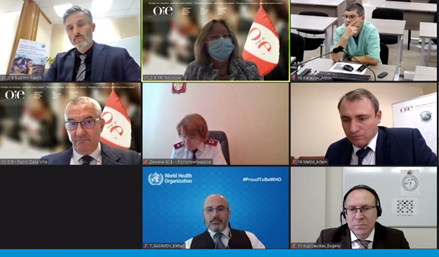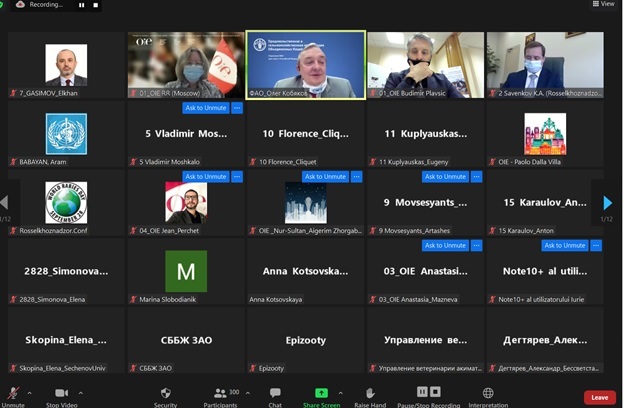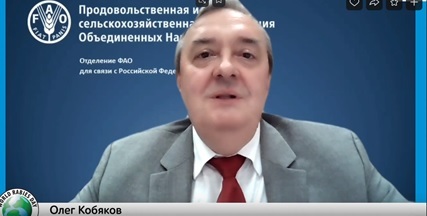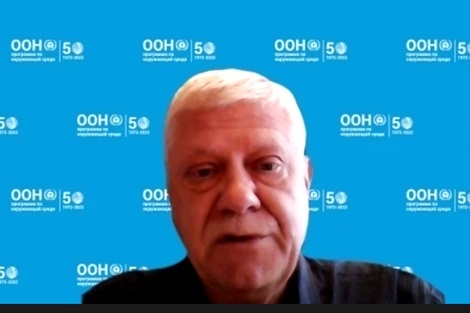MOSCOW/September 28/. On September 28th, on the 15th anniversary of World Rabies Day, the OIE Regional Representation for Europe in Moscow hosted a webinar on Rabies titled “The Global Anti-Rabies Efforts: Human and Animal Vaccines and Eradication Programs”. The event was jointly organized by the Tripartite Plus partners and members of One Health Mechanism in Europe: the OIE Regional Representation for Europe in Moscow, in collaboration with Russian offices of the Food and Agriculture Organization of the United Nations (FAO), the World Health Organization (WHO) and the United Nations Environment Programme (UNEP).
It is the third consecutive year that a specific event about this important zoonotic disease is organized in Russia, in close cooperation with national health counterparts. More than 300 participants joined the webinar Zoom conference, and more than 2000 people watched the webinar live stream on social media.
The webinar featured prominent European and Russian scientists, representatives of the leading One Health International organizations, — the OIE, FAO, WHO and UNEP, and high-level speakers from the Federal Service for Veterinary and Phytosanitary Surveillance (Rosselkhoznadzor) and Federal Service for Surveillance on Consumer Rights Protection and Human Wellbeing (Rospotrebnadzor).
The host of the event, Dr Budimir Plavsic, the OIE Regional Representative for Europe in Moscow, underlined the importance of the One Health approach through the prism of this year’s World Rabies Day theme: “Rabies: Facts, not Fear”.
“National governments, regional administrations together with official and private veterinary services, international organizations, research institutes, industry, and other stakeholders, should join global efforts to reach the goal of Zero Death in Humans caused by Rabies by 2030, – declared Dr Plavsic. – Considering the availability of safe and effective rabies vaccines for domestic animals and wildlife carnivores, and high level of scientific knowledge of the infection, we declare that complete rabies elimination is achievable”.
Dr Budimir Plavsic highlighted that, in line with OIE international standards on animal health, the following should be in place in each country for total elimination of Rabies:
“National governments, regional administrations together with official and private veterinary services, international organizations, research institutes, industry, and other stakeholders, should join global efforts to reach the goal of Zero Death in Humans caused by Rabies by 2030, - declared Dr Plavsic. - Considering the availability of safe and effective rabies vaccines for domestic animals and wildlife carnivores, and high level of scientific knowledge of the infection, we declare that complete rabies elimination is achievable”.
Acting Chairman of Moscow Tripartite Plus Mr. Oleg Kobiakov, Director of the FAO Liaison Office with the Russian Federation, also marked the effectiveness and significance of the Tripartite Plus collaboration under the One Health concept in tackling zoonotic diseases and antimicrobial resistance issues. Mr. Oleg Kobiakov also noted the importance of public awareness campaigns and social advertisement for successful rabies elimination.
Dr Konstantin Savenkov, OIE Council Member, and Deputy Head of the Russian Federal Service for Veterinary and Phytosanitary Surveillance (Rosselkhoznadzor), noted concrete current and future developments in Russia to eradicate rabies and reach the goal of zero human deaths from dog-mediated rabies by 2030, such as: increasing awareness, large scale implementation of oral immunization campaigns in wildlife, and focusing on best internationally recognized practices. Dr Savenkov also stressed the negative influence of the COVID-19 pandemic on rabies distribution.
“Increase of awareness and information campaigns remain the key measures to prevent human death from Rabies in Russia. In 2021, five people died of Rabies in Russia, and 85 per cent of patients did not seekr medical treatment after being bitten by a rabid animal”, said Dr Yulia Demina, Deputy Head of the Epidemiological Surveillance Department Federal Service for Surveillance on Consumer Rights Protection and Human Wellbeing (Rospotrebnadzor).
Dr Elkhan Gasimov, expert of the World Health Organization Regional Office for Europe, from the Division of Country Health Programmes, discussed importance of education for rabies elimination and presented WHO educational platform for Rabies.
Mr Vladimir Moshkalo, the Head of the UN Environment Programme in Russian Federation insisted that environmental issues such as biodiversity loss, habitat loss, climate change and environmental pollution worsten the situation with dangerous zoonotic diseases, such as Rabies.
A presentation about the history and modern developments for prophylaxis and treatment of rabies was delivered by Prof. Hervé Bourhy, Director of the WHO Collaborating Centre on Rabies in the Institut Pasteur (Paris, France). Prof. Bourhy provided a comprehensive overview of new approaches and products for prevention of human Rabies, such as production of novel heat-stable vaccines, subunit vaccines, adjuvants and blocking interaction between viral proteins.
Dr Florence Cliquet, Research Director of the Reference Laboratory for Rabies of the World Organisation for Animal Health (OIE) and the World Health Organisation (WHO), shared her experience and knowledge about successful Rabies eradication programs in Europe, which brought a majority of EU countries close to Rabies elimination. In her presentation, Dr Cliquet described very valuable practical recommendations regarding oral vaccination and major setbacks encountered in Europe. Her interview about oral vaccination campaigns in Europe could be found here.
A presentation titled “Stray Dog Control in Europe” was provided Dr Paolo Dalla Villa, Officer for Disaster Management and Animal Welfare from the OIE Sub-Regional Representation in Brussels. Dr Dalla Villa presented the OIE global and regional activities, framework and tools on stray dog control, such as the OIE Platform on Animal Welfare for Europe, the OIE Regional stray dog roadmaps, OIE Self-Assessment and Monitoring Tool and Terrestrial Animal Health Code chapter 7.7.
Rabies Eradication Programmes in Europe, Dr Florence Cliquet, Research Director, ANSES Laboratory on Rabies Wildlife Diseases (France)
Stray dog control in Europe, Dr Paolo Dalla Villa, Technical Officer, Disaster Management and Animal Welfare, OIE Sub-regional Office (Brussels)
WHO, OIE, FAO, and UNEP Joint Initiatives on Rabies Control, Dr Elkhan Gasimov, Division of Country Health Programmes, World Health Organization, Regional Office for Europe (Copenhagen, Denmark)
Rabies Eradication: International Experience, Dr Artem Metlin, Head International Relations, Federal Centre for Animal Health, ARRIAH (Russia)
Rabies statistics in Russia: wildlife and agriculture, Dr Anton Karaulov, Head of the Information Analysis Centre under the Department for Veterinary Surveillance, Federal Centre for Animal Health, ARRIAH (Russia)
Russian Kynological Federation’s Support to the «Zero by 30» Global Strategy, Dr Eugeny Kuplyauskas, Advisor to the President of the Russian Kynological Federation (Russia)







